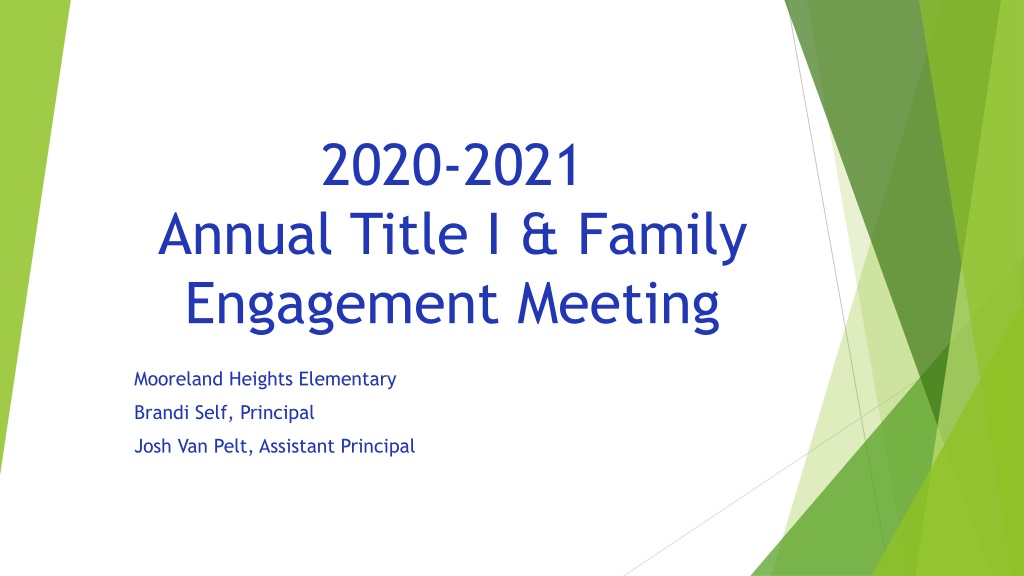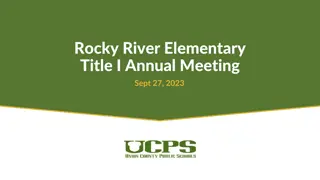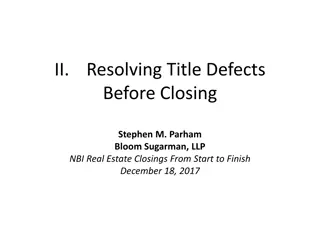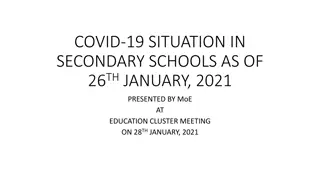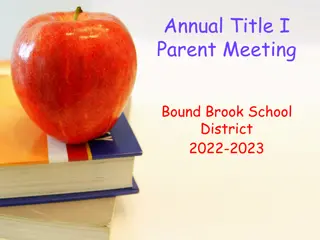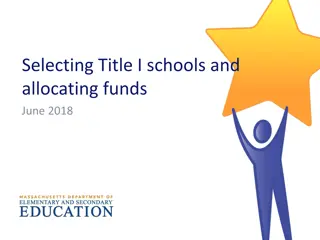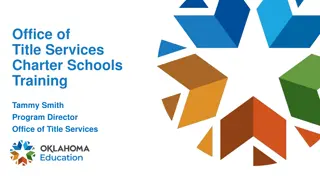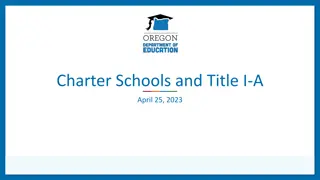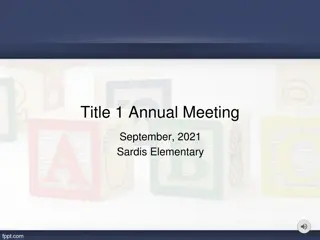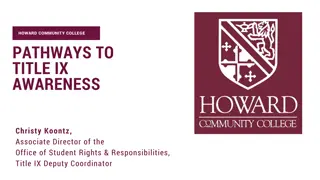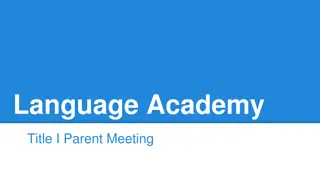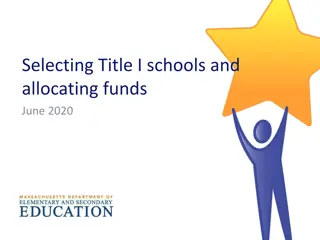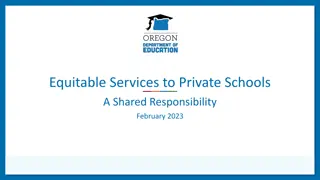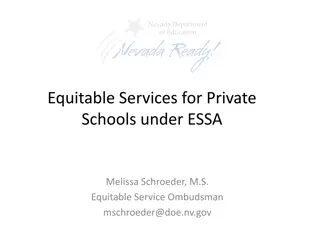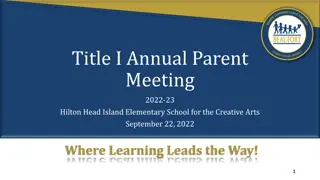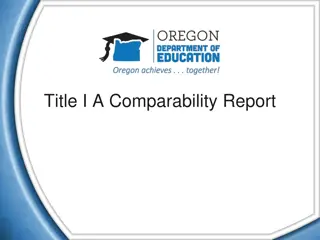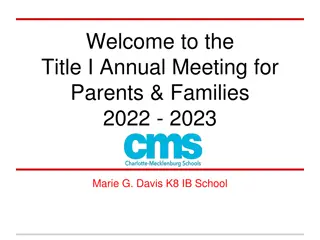Understanding Title I Programs in Schools
Title I programs play a significant role in supporting academic success for students in need. This content explains the purpose of Title I schools, parents' rights, permissible uses of Title I funds, and more to enhance family engagement and student performance.
Download Presentation

Please find below an Image/Link to download the presentation.
The content on the website is provided AS IS for your information and personal use only. It may not be sold, licensed, or shared on other websites without obtaining consent from the author. Download presentation by click this link. If you encounter any issues during the download, it is possible that the publisher has removed the file from their server.
E N D
Presentation Transcript
2020-2021 Annual Title I & Family Engagement Meeting Mooreland Heights Elementary Brandi Self, Principal Josh Van Pelt, Assistant Principal
Why are we here? The Every Student Succeeds Act (ESSA) requires that each Title I school hold an annual meeting of Title I families in order to: Inform you of your school s participation in Title I. Explain the requirements of Title I. Explain your rights as parents and family members to be involved.
What will I learn? What is a Title I school? What are my rights? What can Title I funds be used for? How does our school use Title I funds? What is the School Plan? What are our schoolwide program goals? How is parent and family engagement funded? What is the Parent and Family Engagement Policy? What is the School-Parent Compact? What curriculum does our school use? What tests will my child be taking? How can I be involved? Who can I contact for help?
What is a Title I school? Title I was passed in 1965 under the Elementary and Secondary Education Act (ESEA). It is the largest federal assistance program for our nation s schools. Title I schools receive extra funding (Title I dollars) from the federal government. These dollars are used to: identify students experiencing academic difficulties and provide assistance to help these students purchase additional staff, programs, materials, and/or supplies conduct parent and family engagement meetings, trainings, events, and/or activities 4
What are my rights? The families and parents of Title I students have a right, by law, to: Be involved in decisions made at both the school and district level Be provided with information on your child s level of achievement on tests in reading/language arts, writing, mathematics, and science Request and receive information on the qualifications of your child s teacher and paraprofessionals who are working with your child Request opportunities for regular meetings to formulate suggestions and to participate, as appropriate, in decisions about the education of your child. The school is required to respond to any such suggestions as soon as practicably possible. 5
What can Title I funds be used for? In general, Title I funds my be used for: smaller class sizes additional teachers and paraprofessionals additional training for school staff extra time for instruction (before and/or after school programs) parent and family engagement activities a variety of supplemental teaching materials, equipment, and technology 6
How does our school use Title I funds? In 2020-2021, our school was allotted approximately $281,000in Title I funding. We developed a Schoolwide Program, which means we plan to spend our funds on the following: Supplemental staff: Instructional Coach, Social Worker, Restorative Practice, Educational Assistants Programs/Materials/Supplies: Iready ELA and Math, LearingA-Z, BrainPop Jr., SeeSaw, Nearpod, Instructional Supplies, PBIS Incentives Teacher Professional Development: Summer Planning, Kagan Trainings Enrichment/Tutoring Afterschool Field Trips 7
What is the SIP? The SIP is the School Improvement Plan. It includes: the identification of the school planning team and how they will be engaged in the planning process a needs assessment and summary of academic and non-academic data prioritized goals, strategies, and action steps to help address the academic and non-academic needs of students teacher and staff professional development needs budgets and the coordination of resources. The school must include family representatives on our school planning team. [Families must be involved in the SIP process, and the school can determine who is involved and does not have to include all families. It is, however, best practice to have family representation on the SIP team that reflects the population and diversity of the school community.] 8
What are our schoolwide program goals? Increase academic achievement in ELA. Increase academic achievement in Math. Promote safe and healthy students. 9
How is parent and family engagement funded? Any district with a Title I allocation exceeding $500,000 is required by law to set aside 1% of it s Title I allocation for parent and family engagement. Of that 1%, 10% may be reserved at the district for system-wide initiatives related to parent and family engagement. The remaining 90% must be allocated to all Title I schools in the district. You, as Title I parents and family members, have the right to be involved in how this money is spent. 10
How is parent and family engagement funded? In 2020-2021, we received approximately $4,000 in parent and family engagement funding. We plan to use these funds for: Parent and Family Engagement Meeting and Events Literacy, Math, and Science Night Books and math manipulatives. 11
What is a Parent and Family Engagement Policy? These plans address how the district and school will implement the parent and family engagement requirements of ESSA. Components should include: how parents and families can be involved in decision-making and activities how parent and family engagement funds are being used how information and training will be provided to families how the school will build capacity in families and staff for strong parent and family engagement You, as a Title I parent or family member, have the right to be involved in the development of these plans. 12
What is a Parent and Family Engagement Policy? The school Parent and Family Engagement Policy will be shared in the Beginning of the Year Student Packet. In addition, the policy can be found here: Mooreland Heights Website School Office https://docs.google.com/document/d/1RKlNWxbMqdlpdN1Ey8WyrDaSMssCQsm Z97vrbhNtsoU/edit?usp=sharing 13
What is a School-Parent Compact? A school-parent compact is a written commitment that outlines how the entire school community teachers, families, and students will share the responsibility for improved academic achievement. The compact must describe how the school will: provide high-quality curriculum and instruction hold parent-teacher conferences, annually in elementary schools provide parents with reports on their child s progress provide parents reasonable access to staff provide parents opportunities to volunteer ensure regular two-way meaningful communication between family members and staff, to the extent practicable, in a language family members can understand You, as a Title I parent or family member, have the right to be involved in the development of the compact. 14
What is a School-Parent Compact? The school-parent compact will be shared in the beginning of the year packet of school information. In addition, the compact can be found here: Mooreland Heights Website https://docs.google.com/document/d/1LipKW2ro3R40 4tvllyVjKS7AZgJGWkXczSrlJ64mgP0/edit?usp=sharing 15
What curriculum does our school use? The Tennessee Academic Standards provide a common set of expectations for what students will know and be able to do at the end of a grade for each subject area. Tennessee's academic standards form the framework for everything taught at Mooreland Heights For more information about Tennessee s academic standards, see: https://www.tn.gov/content/tn/education/instruction/acade mic-standards.html 16
How can I be involved? We need you! Research has proven that family engagement in education has more impact on student achievement than any other factor. To get involved with the SIP and major committees please contact the office. Your input is always appreciated! 17
